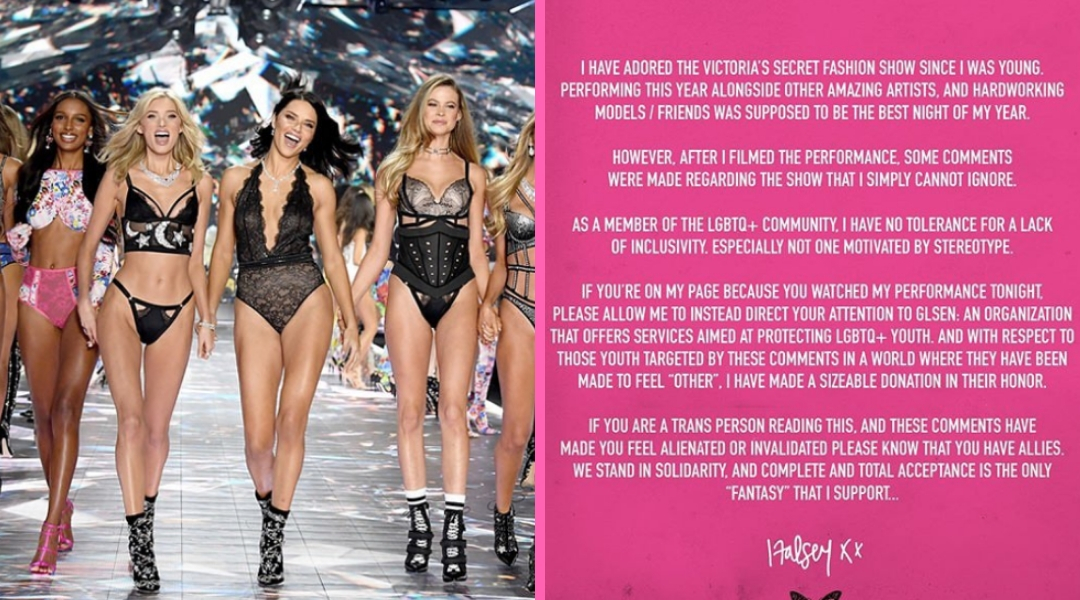The 2018 Victoria’s Secret Fashion Show aired last night on December 2 – with it came a predictable slew of thinkpieces on the need to diversify the body types, races, gender identities on the runway. Over the last few years, the company seems to have made half-assed attempts at this, with almost half of the models in 2017’s show being black, Asian, or hispanic. Yet, when asked about the role “transsexuals” or “plus-size women” could play in Victoria’s Secret’s revamped production, CMO Ed Razek put the company’s collective foot in its mouth, professing that these women are not a part of society’s “fantasy” of women’s bodies.
This is nothing new. Controversies around the show and its models have ranged from disregard for PETA’s ethical standards to blatant cultural appropriation to unfiltered racism.
We are sorry that the Native American headdress in our fashion show has
upset individuals. The outfit will be removed from the broadcast.— Victoria’s Secret (@VictoriasSecret) November 10, 2012
Yet models have gone on record defending the show, calling it “empowering” for young women to see role models who “own their sexuality and [are] in charge”. This is a convenient cop out. Harper’s Bazaar has an excellent article that points out how this version of empowerment has little to do with actually improving conditions for the female collective, used instead as an excuse for models to flaunt their personal successes.
Within the industry, women have called for boycotts. Australian model Robyn Lawley has put out a petition on Change.org listing her qualms with a show that is steeped in body-shaming and unhealthy expectations of its models. Erin Heatherton, who had previously been in the show, has stepped away after being told to lose weight. Model Ashley Graham, in a tongue-in-cheek post on Instagram, has called out the brand for still excluding diverse body types when previously exclusionary institutions like Swimsuit Illustrated have embraced body positivity on their covers and runways. Criticism has caused the show’s viewership to spiral by 32% between 2016 and 2017.
Yet most critiques of VS remain centred on the lack of “diversity” and “cultural sensitivity” exhibited by the company, leaving structural problems largely unaddressed. The truth is, even if the VS fashion show were to transform into some liberal haven of multi-gendered and size-varying bodies, “women’s empowerment” would still be far from achieved. For the brand operates in a nefarious web of consumerism that exploits labour in the global south so it can sell lacy thongs at slashed prices. And who buys these? Young women trapped within a system that makes them believe that displays of the (suntanned, airbrushed) female body are empowerment.
Women working in the sweatshops that produce these symbols of liberal feminism remain excluded from the empowerment narrative, with neither bargaining rights nor any guarantee of a decent living wage. Yet an estimated US $22 million is spent on the fashion show itself, including anything ranging from US $1-10 million on the “fantasy bra” featuring elaborate embroidery and precious stones sourced from around the world.
VS’ sourcing of fabric is equally suspect. According to a Mic report, “America’s largest brand of lingerie gets its textiles from Delta Galil Industries, a company with a warehouse in the Barkan Industrial Zone, an Israeli settlement in the West Bank.” By supporting an Israeli company located on a settlement, VS contributes to a regime that is systematically stripping Palestinians of their land. Whether the brand’s cotton is organic or not becomes a tertiary concern in the face of such disregard for human life.
The fashion show is nothing more than a symptom of the callousness festering both within Victoria’s Secret and the fashion industry as a whole. Brands like La Senza and Enamor in India have equally suspect production processes, making them party to the larger problem.
Including more diverse bodies and colours will simply slap a bandaid on this structural issue, concealing the large-scale dehumanisation of women who don’t fit within the narrative of liberal feminism. Don’t let the facade of inclusion deceive you – there is no benefit to sewing up small holes if we ignore the huge rips in the fabric of the fashion industry.

Credit: Tailor and Circus Instagram.
Instead, support ethical producers. Brands like Tailor and Circus and Underworld Co. are making strides in the nascent ethical underwear industry in India. Take care of your underwear so it can last for years instead of jumping on the bandwagon of the latest trend in “sexualising your body”. And for the sake of hundreds of thousands of women in the global south, please stop contributing to the glorification of the Victoria’s Secret fashion show.

